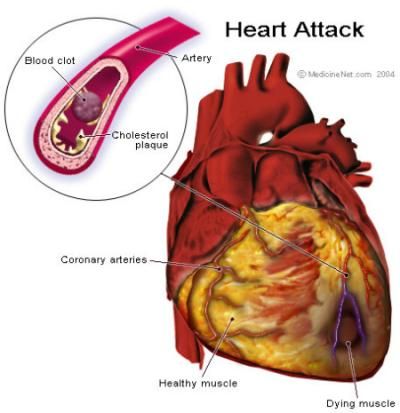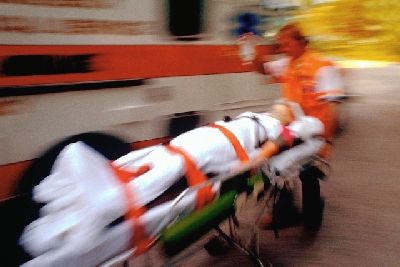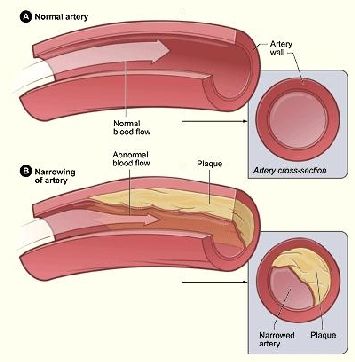
Publisher:
Bonnie King
CONTACT:
Newsroom@Salem-news.com
Advertising:
Adsales@Salem-news.com

~Truth~
~Justice~
~Peace~
TJP
Jan-22-2010 21:43

 TweetFollow @OregonNews
TweetFollow @OregonNews
Heart Attacks
Wayne Pierce Salem-News.comThere is a lot to know, here are ideas that can help you plot a safe course.
 Courtesy: doctorq.ca |
(EUGENE, Ore.) - Each year 300,000 people die of heart attacks on the way to the hospital. Many others die of heart attacks in their beds or while going about their daily lives. Because clogged arteries that cause most heart attacks can be successfully repaired with bypass surgery or stents, the question is raised as to why this tremendous loss of life? Unlike most maladies that occur in the human body, clogged arteries, which can occur anywhere in the circulatory system, are not easily detected by the patient or their doctor and are often overlooked when doctors who fail to take advantage of basic tests available to them. Also, our basic knowledge about our health is often a matter of pharmaceutical and food company marketing propaganda and folklore that results in a false sense of well being that results in our ignoring our symptoms.
Studies have shown that including raw oat bran (very coarse and cheap) in our diet can reduce our cholesterol level.
However, is it wise to be comforted by marketing claims that that consuming highly processed breakfast cereals made of oats will protect us from heart disease? More importantly, might the food and pharmaceutical corporations’ marketing claims about the connection between cholesterol level and heart disease be false?
In his book, “Eat Your Cholesterol: How to Live off the Fat of the Land and Feel Great,” June 24, 2003, Dr William Campbell Douglass claims that our concerns over our cholesterol levels are unfounded. Having normal cholesterol, eating a low-fat diet, and exercising might help, but do not assure that one will not have a heart attack[1].
Smoking is another matter and is probably the greatest cause of the plaque buildup in the arteries that eventually become blocked and cause strokes, heart attacks, kidney failure, and other problems. Studies are available that discuss how the walls of the arteries protect themselves from acidity in the blood by forming the coating we know of as plaque. Smoking raises the acidity in the blood considerably. Eating ice cream does not.
As with other illnesses, individual awareness of heart problem symptoms is very important. Unlike a toothache, symptoms of blocked arteries to the heart requires education about the symptoms plus a certain amount of guesswork. Standard symptoms include pain in the chest, left arm, and jaw. Also, shortness of breath. These can easily be overlooked and attributed to other maladies, such as heartburn, bad shoulder, etc. I think it safe to assume that some people suffer heart attacks without having been aware of any symptoms.
Assuming that we are knowledgeable about heart attack symptoms and sensitive to our body when it is “talking to us”, if we sense that we are having problems, the next logical step is to see our doctor. However, when it comes to dealing with heart attack symptoms, doctors are not equally trained or qualified, which is serious. Poor judgment on their part can result in heart damage or death. Though blood tests are available for predicting heart attacks, doctors often don’t bother. Though tests are available to detect whether someone has had a heart attack, again doctors often don’t bother.
The following examples are taken from true stories that illustrate how greatly doctors vary in their reactions to patients who complain about what they felt were symptoms of a potential heart attack or actual heart attacks. Names are fictitious.
Paying attention to signs
Tom goes to his doctor and complains of chest pains and says he is worried about a possible heart attack. His doctor listens to his heart, takes his blood pressure, and reviews his previous cholesterol levels, which are OK. Without advantage of the blood test that might predict a potential heart attack, the doctor tells Tom that everything looks OK and that he should call his office if his symptoms continue or become worse. In this case, the doctor has not diagnosed the cause of Tom’s chest pains, nor has he ruled out a potential heart attack. People who put their trust in the hands of incompetent doctors like this often leave their office at risk of heart attack and death.
Learning more
Sally has been suffering symptoms similar to Tom’s, so she discusses this with her doctor. She says she is worried that she might have heart problems. Though her vitals and cholesterol are OK, the doctor wants to be certain, so she refers her to a cardiologist for an angiogram, which is the sure way of determining if arteries are blocked. In this case, the cardiologist concluded that Sally’s symptoms were not caused by blocked arteries, but other causes. It should be noted that, like all intrusive procedures, angiograms carry slight risks.
Emergency Hospital

If we are experiencing symptoms of a potential heart attack, or we feel that we have had a heart attack, the best option is to call 911 and be rushed to Emergency. However, doctors at Emergency are not specialists and their responses vary just as in the cases mentioned above. If the patient’s problem occurs after hours, the doctor must decide whether or not to call in the cardiologist who is on call. Doctors might base their opinions about the patient’s complaint by checking vitals and running a quick EKG test.
Frank awoke in the night with sharp pains in his chest and was certain he was having a heart attack. Unwisely, he proceeded to get dressed and drive himself to Emergency.
Vitals were taken and the doctor ran the normal quick EKG test before telling Frank that he appeared to be OK and the EKG test did not indicate he was having a heart attack.
Frank said, “No, I had a heart attack at home; that’s why I am here.” The doctor talked about possibly keeping him in the hospital overnight. However, he didn’t think this necessary and sent Frank home.
The next night, Frank had what he thought another heart attack and again drove himself to Emergency. He was tended to by a different doctor, who of course had reviewed the previous night’s doctor’s report. What’s with this guy, Frank anyway.
The doctor again took Frank’s vitals and ran a quick EKG. He looked at the EKG graph and told Frank that he was not having a heart attack and left the room. Frank was left lying on the exam table while the attending nurse ignored him and went about her business.
Suddenly, Frank felt the familiar sharp pain in his chest and expressing his frustration and anger, he told the nurse rather loudly, “Well, I am having a Goddamned heart attack right now!” The nurse called the doctor in and finally they reacted as though they were dealing with a real emergency.

Start the IV, nitroglycerin, tilt the table and raise his feet... They must have administered a sedative, for Frank was soon oblivious to what was going on. However, through the fog he became aware that a cardiologist was leaning on the rail of his bed and talking to him. The doctor told him that he had suffered a heart attack and that he was taking him to surgery. When Frank awoke the next day, the cardiologist showed him angiogram pictures of his heart and the blocked artery that had caused his heart attack.
This lack of attention and action on the part of these two Emergency Room doctors could have easily resulted in major damage to Frank’s heart or death.
Recommendation: If you feel you have symptoms of a potential heart attack, don't waste precious time and possible misdiagnoses: call a cardiologist. Based upon your symptoms, the cardiologist will want you to come in for an exam, or you will be directed to report to the hospital where he will meet you. This is their specialty and their response will be totally different than that of primary doctors. On the other hand, if you feel you have already had a heart attack and are in Emergency, insist that they call in a cardiologist--no matter what time of night it is. These steps can prevent heart attack, heart damage, and even death.
Blood Thinners
Most of the seniors I talk with are are taking blood thinners prescribed by their doctors. The purpose is to reduce the risk of blood clots that can become lodged in the brain, causing stroke, and in the arteries of the heart, causing heart attack. These clots can also lodge in lungs, and numerous other critical places[2].
Though pharmaceutical companies are making a fortune with products such as Plavix, aspirin is the blood thinner of choice. The literature for the blood thinner, Coumadin, says that only patients who cannot tolerate aspirin should take this medication. The marketers of Plavix put a twist on this. Plavix is only claimed to be effective if taken with aspirin. I have seen pieces in AARP that advise against taking Plavix, and only taking aspirin. I will discuss my views as to why later on[3].
Though blood thinners might prevent serious problems such as stroke and heart attack, they create risks of their own due to internal bleeding. It sounds simple enough until you run into problems suffered by a friend, in the hospital for days due to heavy bleeding from the colon. Though a surgeon was prepared to cauterize the problem area on her colon to stop the bleeding, she decided to stop taking Plavix to see if that would help. Next time the surgeon checked, he told her the bleeding had stopped and he would not have to operate. Ironically, if they were to proceed with the surgery, she would have had to discontinue the blood thinner for the usual five days anyway in order for her blood to clot properly during and after surgery[4].
Even blood thinners such as aspirin can result in more serious consequences. Those of us who have been around awhile do not need to read scientific studies, but only need observe what is happening with our relatives, friends, and with ourselves.
Serious consequences of blood thinners:

After suffering a massive heart attack, George's vascular surgeon wanted to perform quadruple bypass surgery. However, George had been taking a blood thinner, so he spent the next five days in a hospital bed while his blood coagulation process returned to normal. Though his bypass surgery was successful, the delay in removing the blocked artery resulted in permanent damage to his heart muscle.
Also after suffering a massive heart attack, Helen’s vascular surgeon planned to perform bypass surgery. Again, it was delayed for five days due to her blood thinners. Unfortunately, she did not survive the surgery.
In other words, common aspirin is a blood thinner that reduces our system’s ability to coagulate our blood. Therefore, if we need any type of surgery or procedure that will cause bleeding, it must be suspended for five days before the procedure is performed.
Educating ourselves
We must all educate ourselves about our bodies and our healthcare system. We must study the effectiveness and dangers of prescription and over-the-counter drugs and products. We can no longer trust pharmaceutical companies, whose claims are often based upon faulty studies, performed by doctors who happen to be employees of, or own stock in the company.
We can no longer depend upon “our representatives” in the U.S. government who are heavily lobbied and receive financial support from pharmaceutical corporations. We cannot trust the media groups who make billions of dollars publishing dishonest and deceptive ads for the pharmaceutical corporations. Most sadly, we cannot trust many of our doctors, who are heavily courted by pharmaceutical corporations and who often own stock in health care products.
We live in an age where lack of knowledge and awareness can result in harm, while costing us a fortune. The Internet provides many sources of information about prescription and non-prescription medications. “WorstPills.org is a web site that provides information on many products[5].
[1] Amazon.com Eat Your Cholesterol: How to Live Off the Fat of the Land & Feel Great (Paperback)
[2] stroke.about.com/od/caregiverresources/a/blood_thinners.htm
[3] plavixinjurylawyer.com/ [4]mayoclinic.com/health/warfarin-side-effects/HB00101 [5] worstpills.org
Previous articles by Wayne Pierce on Salem-News.com
- Jan-12-2010: Healthcare Costs and Billing: Health Insurance PlansWayne Pierce for Salem-News.com
- Jan-08-2010: American Healthcare is Becoming a Dangerous Practice - Wayne Pierce Salem-News.com
- Dec-26-2009: Is it Too Late for the U.S. Economy? - Wayne Pierce Salem-News.com
- Nov-08-2007: Outsourcing A Nation's Workforce - Commentary by Wayne Pierce Special to Salem-News.com
 Wayne was born in a small farm town in California's San Joaquin Valley. At age ten, he moved with his family to San Jose, California, which at the time had a population of 50,000 and was surrounded by orchards--mostly prunes. At age twenty, he joined IBM, one of the first electronic plants that would evolve into what we know today as Silicon Valley. Most of his college education was acquired through part-time classes while sometimes working ten hours a day. Wayne started on the bottom in the magnetic disk manufacturing facility, which produced the large disks for the earlier IBM computer systems. These magnetically coated disks would evolve into what we know today as hard drives. Wayne's last assignment with IBM was setting up their first inkjet printer lab that became what we know today as the Lexmark printer business. After his retirement from IBM, he wrote human interest stories for a small town newspaper.
Wayne was born in a small farm town in California's San Joaquin Valley. At age ten, he moved with his family to San Jose, California, which at the time had a population of 50,000 and was surrounded by orchards--mostly prunes. At age twenty, he joined IBM, one of the first electronic plants that would evolve into what we know today as Silicon Valley. Most of his college education was acquired through part-time classes while sometimes working ten hours a day. Wayne started on the bottom in the magnetic disk manufacturing facility, which produced the large disks for the earlier IBM computer systems. These magnetically coated disks would evolve into what we know today as hard drives. Wayne's last assignment with IBM was setting up their first inkjet printer lab that became what we know today as the Lexmark printer business. After his retirement from IBM, he wrote human interest stories for a small town newspaper.
You can write to Wayne Pierce at:bus215@aeolusblue.com
Articles for January 21, 2010 | Articles for January 22, 2010 | Articles for January 23, 2010
Quick Links
DINING
Willamette UniversityGoudy Commons Cafe
Dine on the Queen
Willamette Queen Sternwheeler
MUST SEE SALEM
Oregon Capitol ToursCapitol History Gateway
Willamette River Ride
Willamette Queen Sternwheeler
Historic Home Tours:
Deepwood Museum
The Bush House
Gaiety Hollow Garden
AUCTIONS - APPRAISALS
Auction Masters & AppraisalsCONSTRUCTION SERVICES
Roofing and ContractingSheridan, Ore.
ONLINE SHOPPING
Special Occasion DressesAdvertise with Salem-News
Contact:AdSales@Salem-News.com
Salem-News.com:



Terms of Service | Privacy Policy
All comments and messages are approved by people and self promotional links or unacceptable comments are denied.
Wayne January 25, 2010 12:09 pm (Pacific time)
Daniel, Thanks for your comments. It sounds like you know how to take care of yourself. Dr Campbell's studies were meant to debunk the pharmaceutical companies' raising our fears about cholesterol so we would buy their toxic products, like Lipitor and Plavix. I don't know what his views are about a vegetarian diet or exercise. You have helped to make my point: I get moderate exercise, eat butter and other regular dairy products. I do not use any vegetable oil except olive oil and cook with lard that I have rendered from back fat. My cholesterol and all blood tests are normal. I am 72 and my BP is normal. My resting heart rate is also 48. I do not take any prescription or over the counter drugs or vitamins. Exercising hard and avoiding meat and fat is no guarantee we won't experience heart attacks. Many fit people whose vitals are normal are hit by heart attacks.
Daniel January 23, 2010 5:17 pm (Pacific time)
Wayne you can have Dr Campbell I will go with Jack Lalaine and Dr Dean Ornish any day ! I still have a resting pluse of 48 at age 62 . I bike up hills with out effort and have not eaten any form of meat for 40 years . The doctors say I have the heart of a 30 year old !
[Return to Top]©2025 Salem-News.com. All opinions expressed in this article are those of the author and do not necessarily reflect those of Salem-News.com.